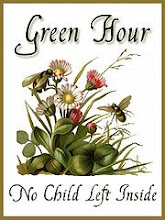'Play is the road to childhood happiness and adult brilliance' Joseph Chilton Pearce
I was talking to a Playcentre mum the other day, and we were discussing the ways that children play in different environments. I've been thinking a lot about this, and I thought it might be interesting (well for me anyway) to look at the 16 areas of play that constitutes the basic Playcentre set up, and compare and contrast the differences betweeen Playcentre and Steiner/Waldorf, and also to look at Montessori while I'm at it!
Before I start with this, I thought it might be helpful to give a little bit of context about the differences between Waldorf, Playcentre and Montessori. These are meant as summaries only, but please feel free to comment if you feel I have missed things out,
Playcentre
Playcentre is marked by a stimulating environment, providing a diverse and rich range of experiences, unlimited free play across all 16 areas of play, and a child initiated curriculum. Early academics are out, its play play play! If a child wanted to do nothing but woodwork all session, every session, she could. The environment is pretty similar to most mainstream kindys, lots of primary colours, children’s art on every wall, recorded music playing and lots of noise and clutter. At Playcentre nationally there is talk about the importance of natural materials, but individual centres differ in how seriously they take this – it tends not to be seen as a top priority. Playcentre teachers are trained parents who take quite a hands on approach in facilitating learning, using a lot of open ended questions to extend children’s thinking.
Steiner Waldorf
Steiner/Waldorf seeks to reduce over-stimulation and to provide a slow and gentle 'awakening' of the young child. The spiritual basis of the Steiner approach influences everything in the kindergarten, although it is more underlying than overt. Waldorf kindergartens provide deep creative play experiences, rather than a diverse range.
In a Waldorf kindergarten there is a strong rhythm, with a balance of free play and collective activities like circle and story time. There is also a weekly rhythm, so rather than all activities being available every day, there is a baking day, a painting day, a modelling day etc.
A lot of care is taken with the materials used - they will be almost all natural, and colour-wise its wood and soft pastels. The walls will be sparsely decorated - a picture of the Sistine Madonna will probably be the only thing hanging up. The Steiner kindergartener (as the teacher is called) is particularly conscious of being 'worthy of imitation' and will typically move slowly and calmly, singing as she works around the classroom engaged in practical tasks like sewing, baking or craftwork. The kindergartener will try to avoid direct instruction or formal teaching, as this would call on the child's intellect rather than allowing him or her to remain in the dreamlike state of early childhood.
Montessori
Montessori is the other approach that I have a lot of time for - although I have less experience here. Montessori sees children as 'little scientists' who go through a series of 'sensitive periods' during which a child is particularly able to learn, for example, music or language or social skills. The Montessori environment is prepared with great care, it is orderly and laid out so that children can access materials independently - everything is child sized and at child height. Children are encouraged to be firmly grounded in reality before being exposed to fantasy. Montessori classrooms are typically very quiet, as children are deeply absorbed in their work. The teacher takes a facilitative role rather than a direct teaching role – he or she prepares the environment, presents the materials, and intervenes if necessary but the focus is on independent learning.
With over 250 years of experience (The first Montessori school opened in 1909, the first Waldorf school in 1919 and the first Playcentre in the 1930s) between them, these three approaches to early childhood education all have impressive pedigrees. I find there is much to be learned by being flexible and looking at different approaches, rather than just sticking doggedly to the Steiner/Waldorf approach which is the one that I happen to feel most closely connected to. I hope you all find these next few posts useful!
Links to Areas of Play Posts






6 comments:
There are elements of all those approaches that I appreciate and have used with my own children. You did a great job summarizing each philosophy.
Will look forward to water play!
Small correction - Playcentre dates from 1941, so it's definitely the new kid on the block!:
"Wellington was the birthplace of the Playcentre movement during 1941 shortly after the outbreak of World War II. Three mothers, Beatrice Beeby, Inge Smithells and Joan Wood wanted to provide some leisure time for young mothers with pre-schoolers. Many women had husbands away at war and they found that by working co-operatively, they could provide some time out for each other as well as becoming involved in the education of young children. As a consequence, those parents who got involved also received greater knowledge about childhood education." - from the Wlg Association website
I quoted that whole piece just to get a sense of how Playcentre philosophy grew - whanau tupu ngatahi - families growing together. A key difference from many early childhood places is that the whole family joins, rather than it being a provider of education for the child. (At least this is how it should work!).
The other thing with Playcentre is that the philosophical base seems to be a bit more fluid than some other approaches. When the 16 areas of play approach was developed, it was influenced by Piaget and the whole "little scientists" thing - create and sustain the environment, let the children do their thing within it. The greater influence of socio-cultural theories over time has meant that the 16 areas of play, while still relevant, have been slightly overtaken by focus on broader curriculum areas (such as maths or literacy) and a different, more active role for skilled adult facilitation. The open ended questions are a good example of that.
Anyway, that's my take on it! One thing I really liked at the Steiner I visited last year was the lack of clutter and sense of calm. I dislike recorded music on session...actually more than dislike....but yes it is there at least some of the time on most days.
Oh, one more thing - your description of the Steiner kindergartener had a lot of resonance with me - the first sentence is very close to a description in one of my books as to how Playcentre parents are supposed to be! I have a sleeping baby on my lap so I can't go and hunt it out - but I must see if I can find the passage some time.
Thanks for such a detailed comment Mary, I was hoping you would bring some great PC expertise to the discussion. I think your comment about the philosophical basis being more fluid is a good one - it ties more to whatever current mainstream thinking is and I think that progression is a good thing, I also really enjoy socio-cultural theory and think Steiner and Montessori both miss a trick there! I have often thought that if PC was run the way that it 'should' be I would just love it - I think I've made the comment before that Pennie Brownlee could almost be a Steiner mum!!!
nice summary! :) i guess my greatest fear in adopting any one pedagogy is that of dogma overriding individual appropriate action.. thus i *attempt* to follow more the spirit & intention on an idea rather than specific decrees :)
maybe once our kids are stand-offish teenagers we should start our own perfect ECE system?!?
"...progression is a good thing..."
Yes, but the flipside is that you can become a slave to fashion! Having a clear philosophical focus guards against this I reckon.
Congratulations on getting this series of posts up and running- I think you are doing an amazing job!
xx
Post a Comment